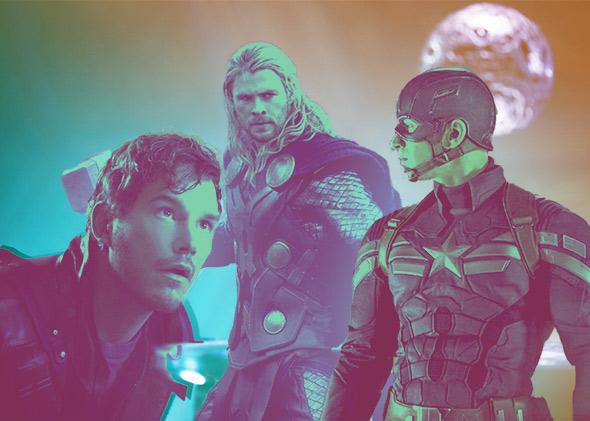The Movie Club is a weeklong conversation about the year in film. Read all the entries here.
Oy. To echo Amy’s sentiments about the unspeakable massacre at Charlie Hebdo, I can’t begin to imagine the degree of courage required to so openly challenge such blind and violent hatred. Often, even at the height of the most “heated” film debates, I’m acutely aware of the safety net provided by the fact that we write about entertainment. Obviously, I have greater reason to trust that it’ll catch me than do some of my colleagues (i.e. women, people of color, anyone else whose very existence might inflame the insecurities of white men, etc.), but the bravery required to stain a movie’s Tomatometer rating isn’t quite the same as that of those who paint targets on their own backs in order to put our world into proper perspective. In these times, I feel like a casual coward even when fearlessly expressing my most controversial opinions.
Dana, an exhilaratingly mediocre film like Birdman: Or the Subtitle That Everyone Conveniently Ignores is nothing if not a lucid illustration of the feedback loop that exists between artists and their critics. For me, the only thing about that movie that isn’t suffocated by the transparency of its agenda is the insularity of the theater (or the cinema), and the symbiosis that sustains everyone in it. Every character in that restlessly agitated wank is a caricature of his or her own petulance, and so it follows that both sides of the argument between Edward Norton’s actor and Lindsay Duncan’s critic are denied an iota of nuance, both parties limited to the simplest justifications for their existence. But what’s so clear in that scene, and what the centrifugal force of the film’s roving cinematography and seamless editing make palpable for the audience, is that everybody in Birdman needs each other. Sure, it’s self-evident that actors need an audience, publicists need the press, and so on and so on, but Birdman impressively traces how the arts world functions as a nearly perfect ecosystem, with all of the various players feeding upon each other with the avidity that word implies. Birdman might think that it’s about picking sides, but everybody in this movie chose each other.
Amy, you asked about comic-book movies; noxious as Birdman can be, it was the only superhero spectacle of 2014 that gave me something to chew on. I’m, uh, not exactly a fan of how comic-con culture has transformed blockbuster cinema (either creatively or financially, though the two have long since been knotted together beyond recognition). The thing that struck me most about superhero movies this year was their desperate need for validation, and how eager superhero movie fans were to help them achieve it. It began with the hilarious notion that Captain America: The Winter Soldier is a political thriller (let alone a relevant one) just because the film’s plot explicitly involves politics. Also, Robert Redford. Captain America: The Winter Soldier is, of course, a Marvel movie, and that’s a category that is mutually exclusive to all others. Guardians of the Galaxy isn’t a space opera, it’s a Marvel movie. Thor: The Dark World isn’t a … um … hmmm … well, whatever it isn’t, it’s definitely a Marvel movie. The studio has become a genre unto itself, one that banally flattens whatever other modes are absorbed into its spectacle.
The assembly line mentality that snuffed out Edgar Wright’s Ant-Man can be felt in every overdetermined story beat and unctuously endearing character (Groot gimmicked his way out of trouble, but Rocket Raccoon was my ’Nam), and so whenever anyone suggests that Marvel movies are even remotely “weird,” it always sounds to me like they’re trying to convince themselves. An adorable humanoid tree voiced by Vin Diesel in a role that neatly fulfills the exact same function as the Hulk in The Avengers? How will America be able to handle it!? The highest-grossing movie of 1984 (the year I was born) ended with a genuine marshmallow monster terrorizing Manhattan, so give me a break. And Amy, I love you, but reminding someone of The Amazing Spider-Man 2 without a trigger warning is just rude.
Anyway, what I really want to talk about, perhaps as some sort of contrived and woefully inadequate way of honoring the dead, is cartoons. Animated movies, to be more specific. Greedy and readily hypnotized by mediocrity, we let the golden age of animation be hijacked by the garishly rounded atrocities of the modern era (I’m looking at you, Frozen). But, even with the tragic demise or cryogenic sleep of Studio Ghibli, 2014 was the first year since the dawn of CG that it felt like there were genuine signs of life, in quality if not quantity. Ernest and Celestine, Song of the Sea, The Congress, and The Boxtrolls were all transporting and widely discussed while The Tale of the Princess Kaguya is the kind of timeless masterpiece that makes me want to have kids just so I can share it with them (and I’ll be sure to let them know that’s the only reason they exist, lest those little bastards try to make me love them or something). Just as encouragingly, original CG features like The Lego Movie and The Book of Life proved that it’s actually possible for technology to augment, not infringe upon, creativity. And just wait until you see Don Hertzfeldt’s new short.
Until next time,
D
